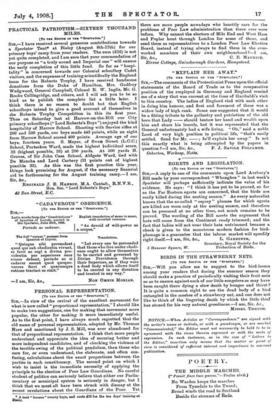PERSONAL REPRESENTATION.
[To THE EDITOR OP THE "SPECTATOR."] SIR,—In view of the revival of the excellent movement for what is now called "proportional representation," I should like to make two suggestions, one for making that movement more popular, the other for making it more immediately useful. As to the first point, I have always much regretted that the old name of personal representation, adopted by Mr. Thomas Hare and sanctioned by J. S. Mill, was ever abandoned for that of proportional representation. I think that more people understand and appreciate the idea of securing better and more independent candidates, and of checking the violence of the terrible swing of the political pendulum, than those who care for, or even understand, the elaborate, and often con- fusing, calculations about the exact proportions between the parties in each constituency. The second point on which I wish to insist is the immediate necessity of applying the principle to the election of Poor Law Guardians. No careful student of politics can seriously believe that either our Parlia- mentary or municipal system is seriously in danger, but I think that we must all have been struck with dismay at the recent revelations about the Guardians of the Poor. Yet A tent "houses" twenty boys, and costs 416 for the ten days' training at Maley. there are more people nowadays who heartily care for the problems of Poor Law administration than there ever were before. Why cannot the electors of Mile End and West Hain and Poplar hunt through London for some of these, and send them as representatives to a London Poor Law Elective Board, instead of trying always to find them in the over- worked members of their own neighbourhood P—I am,


















































 Previous page
Previous page